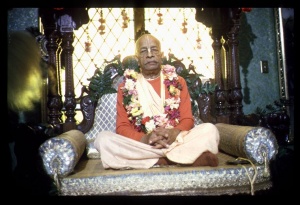SB 9.18.50: Difference between revisions
(Vanibot #0018 edit: make synonym terms in Sanskrit italic in SB - Vanisource) |
(Vanibot #0054 edit - transform synonyms into clickable links, which search similar occurrences) |
||
| Line 23: | Line 23: | ||
<div class="synonyms"> | <div class="synonyms"> | ||
''tam eva'' | ''[//vanipedia.org/wiki/Special:VaniSearch?s=tam&tab=syno_o&ds=1 tam] [//vanipedia.org/wiki/Special:VaniSearch?s=eva&tab=syno_o&ds=1 eva]'' — Him only; ''[//vanipedia.org/wiki/Special:VaniSearch?s=hṛdi&tab=syno_o&ds=1 hṛdi]'' — within the heart; ''[//vanipedia.org/wiki/Special:VaniSearch?s=vinyasya&tab=syno_o&ds=1 vinyasya]'' — placing; ''[//vanipedia.org/wiki/Special:VaniSearch?s=vāsudevam&tab=syno_o&ds=1 vāsudevam]'' — Lord Vāsudeva; ''[//vanipedia.org/wiki/Special:VaniSearch?s=guha&tab=syno_o&ds=1 guha]-[//vanipedia.org/wiki/Special:VaniSearch?s=āśayam&tab=syno_o&ds=1 āśayam]'' — who exists in everyone's heart; ''[//vanipedia.org/wiki/Special:VaniSearch?s=nārāyaṇam&tab=syno_o&ds=1 nārāyaṇam]'' — who is Nārāyaṇa, or an expansion of Nārāyaṇa; ''[//vanipedia.org/wiki/Special:VaniSearch?s=aṇīyāṁsam&tab=syno_o&ds=1 aṇīyāṁsam]'' — invisible to material eyes, although existing everywhere; ''[//vanipedia.org/wiki/Special:VaniSearch?s=nirāśīḥ&tab=syno_o&ds=1 nirāśīḥ]'' — Yayāti, without any material desires; ''[//vanipedia.org/wiki/Special:VaniSearch?s=ayajat&tab=syno_o&ds=1 ayajat]'' — worshiped; ''[//vanipedia.org/wiki/Special:VaniSearch?s=prabhum&tab=syno_o&ds=1 prabhum]'' — the Supreme Lord. | ||
</div> | </div> | ||
Latest revision as of 23:48, 18 February 2024

A.C. Bhaktivedanta Swami Prabhupada
TEXT 50
- tam eva hṛdi vinyasya
- vāsudevaṁ guhāśayam
- nārāyaṇam aṇīyāṁsaṁ
- nirāśīr ayajat prabhum
SYNONYMS
tam eva — Him only; hṛdi — within the heart; vinyasya — placing; vāsudevam — Lord Vāsudeva; guha-āśayam — who exists in everyone's heart; nārāyaṇam — who is Nārāyaṇa, or an expansion of Nārāyaṇa; aṇīyāṁsam — invisible to material eyes, although existing everywhere; nirāśīḥ — Yayāti, without any material desires; ayajat — worshiped; prabhum — the Supreme Lord.
TRANSLATION
Without material desires, Mahārāja Yayāti worshiped the Supreme Lord, who is situated in everyone's heart as Nārāyaṇa and is invisible to material eyes, although existing everywhere.
PURPORT
King Yayāti, although externally seeming very fond of material enjoyment, was internally thinking of becoming an eternal servant of the Lord.